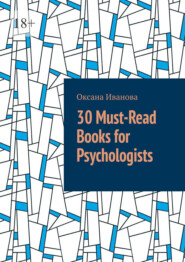скачать книгу бесплатно
«My thesis is that the essence of all consciousness is attention.»
«Habit is the flywheel of society, its most precious conservative agent.»
«Belief creates the fact.»
Criticism:
Some critics argue that James’ focus on observable behavior neglected the importance of internal mental processes.
His theory of emotion has been criticized for oversimplifying the complex relationship between physiology and psychology.
Influence:
«The Principles of Psychology» revolutionized the field of psychology, establishing it as an empirical science.
It introduced key concepts such as the stream of consciousness, habit, and the self.
Its pragmatic approach influenced the development of behaviorism and functionalism.
Interesting Facts:
James initially intended to write a short summary of psychology, but his work grew into a two-volume tome.
The book was praised for its clear and engaging writing style, which made complex psychological concepts accessible to a general audience.
James drew inspiration from both scientific research and his own personal experiences.
WORDLIST:
continuous stream of thought – непрерывный поток мыслей
discrete mental states – дискретные психические состояния
continuous flow of experience – непрерывный поток опыта
habits – привычки
two stimuli are repeatedly paired together – два стимула неоднократно сопряжены вместе
complex tasks – сложные задачи
fixed, unchanging entity – фиксированная, неизменная сущность
are caused by cognitive judgments – вызваны когнитивными суждениями
innate behavior patterns – врожденные модели поведения
thrive – процветать
the essence of all consciousness – сущность всего сознания
flywheel of society – маховик общества
precious – драгоценный
observable behavior – наблюдаемое поведение
neglect – пренебрегать
oversimplifying – чрезмерное упрощение
engaging writing style – увлекательный стиль письма
accessible to a general audience – доступный для широкой аудитории
Exercise 3
Fill in the gaps with some words or phrases from the wordlist.
1. Consciousness is a ______________ of experience.
2. Habits are formed when ______________.
3. James argued that emotions ______________.
4. James believed that the self is not a ______________.
5. James’ writing style was ______________.
6. ______________ play a significant role in human behavior.
7. James’ book was ______________ to a general audience.
8. Critics argue that James ______________ the importance of internal mental processes.
9. James’ theory of emotion has been criticized for ______________ the relationship between physiology and psychology.
UNIT 3
The 7 Habits of Highly Effective People by Stephen Covey (1989)
About the Book
This self-help classic outlines seven fundamental principles for personal and professional effectiveness.
The 7 Habits
Be Proactive: Take responsibility for your choices and actions, focusing on the things you can control.
Begin with the End in Mind: Establish clear goals and align your actions with them.
Put First Things First: Prioritize tasks based on importance and urgency, focusing on the most impactful activities.
Think Win-Win: Seek mutually beneficial solutions, considering the needs and interests of others.
Seek First to Understand, Then to Be Understood: Listen actively to others to truly comprehend their perspectives before sharing your own.
Synergize: Combine different perspectives and ideas to create groundbreaking solutions.
Sharpen the Saw: Continuously invest in personal and professional development to enhance your abilities.
Best Quotes
«The only person you are destined to become is the person you decide to be.»
«Sow a thought, reap an action; sow an action, reap a habit; sow a habit, reap a character; sow a character, reap a destiny.»
«Seek to understand, then to be understood.»
«Interdependence is a higher value than independence.»
«The main thing is to keep the main thing the main thing.»
Criticism
While widely acclaimed, the book has received some criticism:
Oversimplification: Critics argue that the habits are presented as a formulaic solution to complex personal challenges.
Idealistic: Some find the principles overly optimistic and difficult to implement in real-world situations.
Repetitiveness: The book’s emphasis on the seven habits can lead to redundancy and a lack of depth in discussing each one.
Influence
Despite the criticism, «The 7 Habits of Highly Effective People» has had a significant impact:
It has sold over 40 million copies worldwide.
It has been translated into over 40 languages.
It has been used as a training and leadership development tool in organizations and educational institutions.
Interesting Facts
The book was originally titled «The 7 Habits of 10% of the People Who Get Results.»
Covey’s inspiration for the book came from his studies of successful individuals in various fields.
The book has been listed on Fortune’s 100 Best Business Books of All Time.
WORDLIST:
personal and professional effectiveness – личная и профессиональная эффективность
take responsibility – брать на себя ответственность
establish clear goals – ставить четкие цели
align – согласовывать
importance and urgency – важность и срочность
the most impactful activities – наиболее важные действия
seek – искать
mutually beneficial solutions – взаимовыгодные решения
groundbreaking solutions – новаторские решения
sharpen the saw – оттачивать пилу
enhance your abilities – повышать свои способности
sow, reap – посей, пожнёшь
oversimplification – чрезмерное упрощение
formulaic solution – шаблонное решение
overly optimistic – чрезмерно оптимистичный
difficult to implement – трудно реализуемый
repetitiveness – повторяемость
redundancy – избыточность
lack of depth – недостаток глубины
despite the criticism – несмотря на критику
training and leadership development tool – инструмент для обучения и развития лидерских качеств
Exercise 4
Are these statements TRUE or FALSE?
